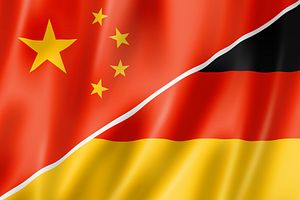German Chancellor Angela Merkel is in Beijing this week, where she held separate bilateral meetings with Chinese Premier Li Keqiang and President Xi Jinping. It’s the second high-profile meeting between Merkel and Xi in just over three months, following Xi Jinping’s stop in Berlin in late March.
As with many of China’s diplomatic initiatives, the primary focus of the trip was economic. Merkel brought a business delegation with her and attended a meeting of the China-Germany Economic and Trade Commission. Merkel hoped to follow up on economic agreements made during Xi’s March visit, which included a deal for Frankfurt to become a clearing and settling hub for transactions involving China’s currency, the renminbi (RMB). According to Xinhua, at their meeting Merkel and Li both expressed hope for increased cooperation on trade, finance, and cultural exchanges.
But there is more to China-Germany relations than trade. Beijing has been working on expanding its relationship with many European countries, and especially with the European Union (EU) as a whole. To this end, increasing ties with Germany, one of the most influential countries on the continent, is an important goal for China. A 2012 report from the European Council on Foreign Relations noted that a new “special relationship” had begun to emerge between China and Germany, as China bet that Berlin would continue to become more influential within the EU. Beijing hopes that Germany’s sway in the EU will reap dividends for China-EU relations down the road.
Again, much of this diplomatic push is tied to trade — Europe would be the end destination of the “New Silk Road” envisioned by Xi. However, there are also important political considerations at stake. As Mu Chunshan wrote for The Diplomat back in April, China’s ultimate goal may be to lessen U.S. influence in Europe by forging its own close ties to the EU. Achieving this goal will require cooperation outside the economic realm, a point highlighted by Xi Jinping in his remarks with Merkel. According to Xinhua, Xi proposed that China and Germany increase their cooperation on improving the current international system. Buy-in from the EU will go a long way toward helping make China’s vision of a multipolar world a reality.
Creating some distance between the U.S. and Germany may have just gotten easier for China in the wake of new allegations that the U.S. sponsored a double agent in Germany. Merkel even fielded questions about this topic at her press conference with Li, calling the allegations (if true) “a clear contradiction as to what I consider to be trusting cooperation between agencies and partners,” according to The Guardian.
Still, although U.S.-Germany ties might be frayed, that doesn’t automatically result in improved relations between China and Germany. There’s a long way to go before China and Germany’s cooperation on security issues matches their dynamic economic relationship. Human rights continue to be a touchy subject, and Merkel told reporters that she planned to discuss the issue in her meetings with Chinese leaders. Meanwhile, Merkel also expressed concern over cyber-espionage directed at German intellectual properties — although Li Keqiang was quick to point out that China and Germany are “both victims of hacking attacks,” a reference to the Snowden leaks revealing NSA espionage against both Beijing and Berlin.

































